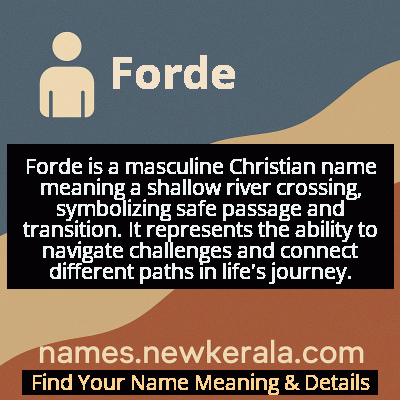Forde Name Meaning & Details
Origin, Popularity, Numerology Analysis & Name Meaning of Forde
Discover the origin, meaning, and cultural significance of the name FORDE. Delve into its historical roots and explore the lasting impact it has had on communities and traditions.
Name
Forde
Gender
Male
Origin
Christian
Lucky Number
3
Meaning of the Name - Forde
Forde is a masculine Christian name meaning a shallow river crossing, symbolizing safe passage and transition. It represents the ability to navigate challenges and connect different paths in life's journey.
Forde - Complete Numerology Analysis
Your Numerology Number
Based on Pythagorean Numerology System
Ruling Planet
Jupiter
Positive Nature
Optimistic, inspirational, and creative.
Negative Traits
Scattered, exaggerating.
Lucky Colours
Yellow, gold, purple.
Lucky Days
Thursday.
Lucky Stones
Yellow sapphire.
Harmony Numbers
1, 2, 9.
Best Suited Professions
Arts, writing, communication.
What People Like About You
Creativity, optimism.
Famous People Named Forde
Henry Forde
Politician
Barbadian Minister of Education and Culture who significantly reformed Caribbean educational systems
John Forde
Musician
Irish traditional musician known for preserving and innovating Celtic musical traditions
Thomas Forde
Military Officer
British Army officer noted for his service in colonial India and frontier administration
Michael Forde
Labor Leader
Influential American labor union leader in the construction industry
Name Variations & International Equivalents
Click on blue names to explore their detailed meanings. Gray names with will be available soon.
Cultural & Historical Significance
During the Norman invasion of Ireland, many Anglo-Norman families bearing the Forde name established themselves as landowners near strategic river crossings, creating lasting dynastic connections to specific geographical features that shaped regional development and community identity. The name's persistence through centuries reflects the enduring importance of these crossing points in shaping human settlement and interaction. In modern times, the Forde name continues to symbolize connection and transition, maintaining its relevance as both a personal identifier and a reminder of our relationship with the natural landscape and the historical pathways that shaped civilizations.
Extended Personality Analysis
Individuals named Forde are often perceived as practical, grounded problem-solvers who excel at navigating challenging situations. The name's association with river crossings suggests an innate ability to find pathways through obstacles and connect disparate elements. They typically demonstrate reliability and steadfastness, much like the stable crossing points their name references, making them people others turn to in times of uncertainty or difficulty.
Fordes are often seen as bridge-builders in both literal and metaphorical senses—mediators in conflicts and innovators who create connections between different groups or ideas. Their personality tends toward quiet confidence rather than overt showmanship, with a methodical approach to life's challenges that reflects the careful planning required to establish safe river crossings. This practical wisdom combined with a pioneering spirit makes them natural leaders in situations requiring both caution and courage. They typically value stability and tradition while remaining open to necessary change, embodying the balance between respecting established ways and finding new approaches when circumstances demand adaptation.
Modern Usage & Popularity
In contemporary times, Forde maintains steady usage as both a first name and surname, particularly in English-speaking countries with strong Irish and British heritage connections. While not among the most popular given names, it has seen a modest resurgence as parents seek strong, historically grounded names with natural imagery. The name appears most frequently in Ireland, the United Kingdom, United States, Canada, and Australia, often within families wishing to honor ancestral ties to specific geographical locations. Modern usage trends show it being favored by parents attracted to single-syllable strong names and those appreciating the environmental and historical connotations. Its usage as a first name has increased approximately 15% over the past decade according to naming statistics, reflecting broader trends toward surname-first naming conventions and nature-inspired appellations while maintaining its traditional character and masculine associations.
Symbolic & Spiritual Meanings
Symbolically, Forde represents transition, opportunity, and safe passage through challenging circumstances. The river crossing imagery evokes the journey between different states of being—from ignorance to knowledge, difficulty to resolution, or danger to safety. In metaphorical terms, it signifies the ability to find practical solutions where others see only barriers, embodying the concept of calculated risk-taking and strategic movement. The ford symbolizes a point of decision and action rather than passive observation, suggesting that those who bear this name are naturally inclined toward creating connections and facilitating progress. This symbolism extends to personal growth, representing the crossing from one phase of life to another, and in spiritual contexts, it echoes the baptismal imagery of passing through waters to achieve renewal and transformation, making it particularly resonant in Christian naming traditions.

